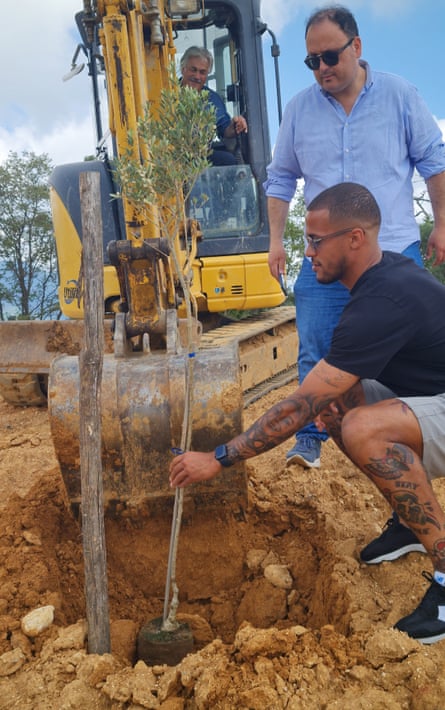Troost-Ekong wants footballers to embrace the culture of tree planting
Troost-Ekong cites two footballers among his influences: Ben Mee who, after his transfer from Burnley to Brentford, compensated for his CO2 emissions by planting trees

This month, on 14 June to be precise, the summer transfer window opens. It is not usually the prompt for a footballer to visit an orchard.
But last week William Troost-Ekong took a trip to see the olive trees planted in Salerno to compensate for the carbon dioxide emissions created by his January loan from Watford to the Serie A side Salernitana.
His move was, he believes, the first carbon-neutral international transfer. The defender says he wanted to switch club “without harming the planet – or at least as little as possible” and believes the wider game should follow suit.
“There is always a lot of money involved in a transfer. It would be good if part of this, and it is actually a small amount, is used as standard to make the transfer climate neutral. This should be the goal for all players and clubs.”

In an ideal world, he would have travelled by train from London to Salerno. Or, even better, by bike. “I had to play a day after the deal was done, so catching a plane was inevitable,” says Troost-Ekong, who was born in the Dutch city of Haarlem and plays for Nigeria.
He took a scheduled flight with a family member from London to Naples (not a private jet as you see with many transfers) and his agent travelled from Milan by train. Troost-Ekong took a taxi to the airport because of all the suitcases. “It wasn’t perfect,” the 29-year-old says. “It can all be even more climate neutral if you have more time to make the trip. But I wanted to make a statement.”
In collaboration with Sokito, a company that produces eco-friendly football boots, a calculation was made of the CO2 emissions, which amounted to about a ton. To compensate, Troost-Ekong donated to Alberami, a project that helps olive farmers in southern Italy to get income from voluntary CO2 offsets and introduce more sustainable farming methods.
International transfers often showcase happy players taking selfies in private jets, clinging to champagne glasses with their partners and agents, then getting a warm welcome at their new clubs, whose directors often took a flight to negotiate the deal.
“I understand people are happy, I’m happy too when I sign at a new club,” Troost-Ekong says. “But we have to think about the impact of all this travelling to the planet.”
He has received positive responses from teammates. “Some have asked how I did that exactly. I believe there are many more players interested but simply not aware of what they can do.”
Troost-Ekong cites two footballers among his influences: Ben Mee who, after his transfer from Burnley to Brentford, compensated for his CO2 emissions by planting trees; and his former Bursaspor teammate John Bostock, who started wearing recycled boots.
“Now I play in recycled football boots too. Normally you wear out seven to eight pairs a year. I took those to Nigeria when I had an international match there to hand out. This gave them a second life. But it can be even ‘greener’, so I’ve learned.”

Troost-Ekong also draws inspiration from fatherhood, the news and his roots in Nigeria. “I see what pollution does, especially in a country like Nigeria. I want my children to enjoy what we enjoy now in the European countries where we live. Clean air, clean water, no extreme drought or high water levels.
“Although you are already noticing changes in the area of climate in Europe, in Africa it is even worse. I am very lucky with what I have now. A wonderful life, a well-paid job, a beautiful family. Then you have to take responsibility yourself to emit less, to recycle, to use the car less, to draw attention to global warming.”




















